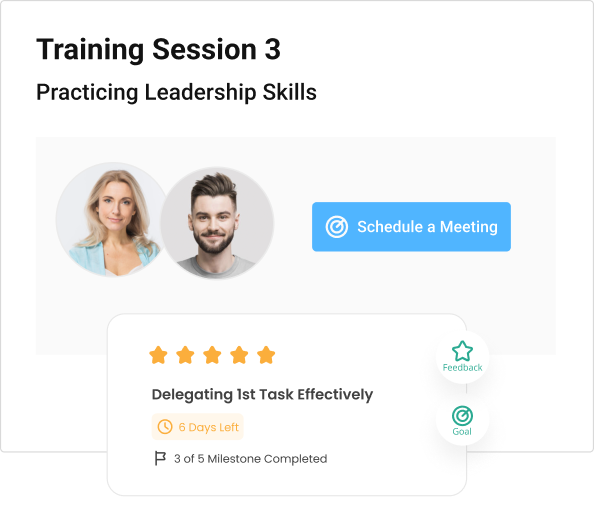The Modern Mentoring Definition: What Mentorship Really Means Today
 Omer Usanmaz
·
7 minute read
Omer Usanmaz
·
7 minute read
Mentoring is no longer just a corporate buzzword or an informal chat between colleagues. In its simplest form, mentorship can also be described as guidance, support, and learning between two people, a concept often used interchangeably with mentorship synonym terms such as “guidance” or “advisory relationship. It has evolved into a strategic, evidence-based initiative essential for organizational growth, career design, and personal development.
While many people search for a clear mentor definition or wonder what is mentorship, modern organizations and universities see it as a dynamic, evolving practice that blends personal development and professional growth. In today’s hybrid and data-driven world, mentorship empowers employees and students alike, improves career success, strengthens professional relationships, and builds resilient developmental networks.
But what is the true mentoring definition today? And how can organizations, universities, and professional associations implement high-quality mentoring programs that deliver measurable developmental outcomes?
Let’s explore the meaning of mentorship, examine its different forms, and discover how Qooper Mentoring Software supports companies, schools, and researchers in designing scalable and ethical mentoring programs that align with both career goals and organizational program goals. In this article, we’ll not only define mentoring meaning but also clarify the mentoring program definition and the mentoring purpose in both educational and organizational contexts.
See How Modern Mentoring Can Transform Your Team
What Is the True Definition of Mentoring?
At its foundation, mentoring, also known as mentorship, is a developmental relationship between a more experienced individual (the mentor) and a less experienced person (the mentee). Together, they engage in learning relationships that encourage growth, reflection, and skill-building.
If you’re asking what does mentoring mean or what is the definition of a mentor, it’s simple:
A mentor is an experienced or trusted adviser who guides, supports, and encourages another person’s academic, personal, or professional development.
In ancient Greece, mentors served as guides and educators, a tradition that continues today in modern workplaces, academic institutions, and community settings.
The Defining Characteristics of Modern Mentorship
- Trust and Confidentiality: The foundation of any mentoring relationship lies in mutual trust. Mentors respect privacy, follow ethical guidelines, and operate within defined Terms & Conditions and Privacy Policies.
- Developmental Focus: Mentoring prioritizes career planning, research skills, and leadership development, not performance metrics.
- Role Modelling: Mentors demonstrate ethical behaviour, professionalism, and soft skills, setting an example for mentees.
- Mutual Learning: True mentoring is a social learning process, both mentor and mentee grow through shared experiences and reflection.
- Distinct from Coaching: While coaching emphasizes Performance Management, mentoring supports holistic growth and career transitions.
Understanding this broader definition of mentoring helps HR professionals, graduate students, and community members cultivate mentoring functions that go beyond supervision and create authentic, lasting learning experiences.
Why Mentorship Matters More Than Ever
In today’s distributed and fast-moving workplaces, mentorship helps fill communication gaps and connects individuals across levels, disciplines, and geographies.
Organizations with structured organizational mentoring programs report stronger engagement, retention, and inclusion, especially within Employee Resource Groups (ERGs) and professional societies.
For students and researchers, academic mentoring provides crucial career support, helping them navigate the learning horizon, develop coping skills, and transition successfully into professional roles.
Whether in business, academia, or research, mentoring is a key developmental conversation that promotes growth, ethical conduct, and collaboration.
The Core Components of a Successful Mentoring Program
1. The Mentor–Mentee Relationship
This is the heart of mentorship. Great mentors listen actively, encourage reflection, and create safe spaces for personal and professional conversations. Mentees, in turn, bring curiosity, openness, and commitment to learning.
Related article: Mentor-Mentee Roles and Expectations
2. Knowledge and Skill Transfer
Effective mentoring enhances both hard and soft skills, from leadership and management skills to communication, ethical behaviour, and research skills. Mentors help mentees manage career pathways and navigate career transitions effectively.
3. Goal Setting and Feedback
Modern mentoring programs emphasize clear mentoring goals, measurable program goals, and structured feedback loops. These enable evidence-based mentoring and track outcomes in terms of career success, employee engagement, and personal growth.
Receive our "Mentorship Goal Setting Template" to your inbox for essential strategies and insights!
Different Types of Mentoring
One-on-One Mentoring
The traditional form, one mentor, one mentee, ideal for personalized learning and deep trust-building.
Group Mentoring
A single mentor works with multiple mentees, often within Employee Resource Groups or Mentoring Communities, fostering collaborative learning and peer support. This style demonstrates a collaborative mentoring style that encourages community support.
Reverse Mentoring
Here, younger or digitally savvy employees mentor senior leaders, bridging digital communication gaps and promoting inclusion. Often used in leadership development, reverse mentoring definition refers to younger employees guiding senior professionals, creating a valuable exchange of digital and cultural insight.
Speed Mentoring
Short, structured mentoring sessions designed to provide focused advice quickly, ideal for busy professionals and mentoring conferences.
Peer Mentoring
Colleagues at similar stages share learning experiences, practice advisers, and supporting skills, often used in universities or professional training programs. This approach perfectly fits the peer mentoring definition, a mutually beneficial relationship that encourages learning between equals.
Distance or Virtual Mentoring
Using digital communication tools like Microsoft Teams, video conferencing, and online platforms, virtual mentor–mentee relationships enable mentorship across locations while ensuring privacy and accessibility.
Together, these formats illustrate what mentoring is not, it’s not supervision, nor a one-sided evaluation, but rather a relationship built on mutual growth.
From Informal to Formal Mentoring Programs
Historically, mentoring was largely informal, spontaneous conversations or ad hoc advice. While informal mentorship remains valuable, it often lacks structure, accountability, and scalability.
Formal mentoring programs, supported by technology, now allow organizations to:
- Define clear pairing criteria based on interests and goals.
- Use automated algorithms and artificial intelligence to match mentors and mentees effectively.
- Track developmental outcomes through HR Information Systems.
- Support employee resource groups, research staff, and community members equally.
- Align mentoring activities with broader organizational objectives and ethical standards
How Qooper Redefines Mentoring Programs
Qooper Mentoring Software modernizes mentoring by combining automation, analytics, and accessibility in one platform. It embodies the true meaning of mentorship through structured, data-driven, and people-centered design.
Key Features of Qooper:
Smart Matching Algorithms
Qooper’s automated algorithms use behavioral data and AI to create optimal mentor–mentee pairings based on career pathways, skills, and interests.Custom Learning Tracks and Developmental Experiences
Tailor paths for youth mentoring, career mentors, or executive leaders to focus on personal development, career advancement, or leadership skills.
Goal Setting and Check-ins
Structured around clear mentoring agreements, these tools encourage consistent engagement and support toward mentoring goals.
Engagement Tracking and Analytics
Real-time dashboards track participation, satisfaction, and outcomes for college students, employees, and other mentees.
Integration with HR and Professional Associations
Connects easily with existing systems to track career knowledge and organizational metrics.
Global Scalability
Supports virtual mentoring programs across time zones and languages, addressing modern workforce diversity.
Whether launching a new mentoring program or scaling an existing one, Qooper provides the tools for effective mentoring relationships and impactful mentoring experiences.
Experience the New Standard in Mentoring with Qooper
Benefits of Implementing Mentorship Programs with Qooper
For Mentees
- Clear career planning and access to professional contacts
- Enhanced communication skills, confidence, and coping strategies
- Connection to diverse support networks and communities
For Mentors
- Strengthened leadership and management skills
- Opportunities for role modelling and ethical behaviour
- Fulfillment from supporting others’ growth and learning experiences
For Organizations
- Higher retention, inclusion, and employee engagement
- Improved developmental networks and organizational mentoring programs
- Measurable data on career success and program impact
Measuring Mentoring Success
Modern organizations no longer rely solely on anecdotal evidence. With Qooper, HR professionals can measure:
- Participation rates and engagement levels
- Mentoring network connections and collaboration patterns
- Correlations between mentoring and career progression, research output, or leadership promotions
- Key indicators such as work-life balance, job satisfaction, and development of mentoring competencies
These data-driven insights enable organizations to continuously refine mentorship strategies and sustain long-term impact.
Ethical and Evidence-Based Mentoring Practices
Every mentoring initiative should respect ethical guidelines, ensure privacy, and maintain compliance with institutional Policies and Terms.
Evidence-based mentoring integrates research and real-world practice, combining scientific and technical development with social cognitive career theory. Programs should promote inclusivity, transparency, and ethical behaviour, ensuring that every participant, from researchers to professional nurses, experiences safe and productive mentoring.
The Future of Mentorship
Mentoring is evolving with current trends such as:
- AI-enhanced matching for precise mentor-mentee pairing
- Increased emphasis on mentorship intervention and supportive policies
- Expansion of mentoring service offerings, including mentoring-as-a-service
- Growth in network ties and developmental relationships supporting organizational agility
As the workforce diversifies, mentoring will remain a core responsibility for executive leaders, senior employees, and career faculty who seek to develop high-performing, highly qualified doctoral students and excellent students alike.
Final Thoughts: Bringing the Mentoring Definition to Life
Mentorship is far more than a role or title, it’s a relationship grounded in trust, learning, and mutual respect.
Through Qooper Mentoring Software, organizations and educational institutions can transform this timeless practice into a structured, data-informed, and ethically managed program, one that supports students, employees, researchers, and business owners alike.
Empower your people. Expand your mentoring community. And bring the true definition of mentorship to life through meaningful, measurable human connections.
A well-designed mentorship program definition clarifies roles, expectations, and goals, ensuring every participant understands their responsibilities. Mentorship roles vary from guiding career pathways to supporting personal growth. In professional settings, a work-based mentor definition emphasizes real-world skill development and ethical guidance. By combining structured programs with meaningful human connections, organizations ensure high-quality mentoring that benefits both mentors and mentees.
FAQs
1. What is the true definition of mentoring today?
Mentoring is a developmental relationship between an experienced individual (mentor) and a less experienced person (mentee) designed to support personal growth, career advancement, and skill development. Unlike the traditional apprenticeship model, modern mentoring emphasizes two-way communication, trust, and mutual learning.
2. Why is mentoring important in the workplace?
Mentoring strengthens employee engagement, retention, and leadership development. It improves diversity and inclusion outcomes, helps employees gain new skills, and enhances adaptability in hybrid and remote work environments.
3. What are the key components of a mentoring program?
Effective mentoring programs are built on a strong mentor-mentee relationship, knowledge and skill transfer, and structured goal setting with continuous feedback. These components ensure alignment with both career development and organizational goals.
4. What are the different types of mentoring?
Common mentoring formats include one-on-one mentoring, group mentoring, reverse mentoring, flash mentoring, peer mentoring, and informational mentoring. Each serves unique purposes, from personalized guidance to broader knowledge sharing.
5. How have mentoring programs evolved from informal to formal structures?
Historically, mentoring occurred through informal, unstructured conversations. Today, organizations rely on formal, scalable programs supported by mentoring software. These structured initiatives provide measurable outcomes, accessibility, and executive alignment.
6. How does Qooper support mentoring programs?
Qooper modernizes mentoring through smart matching algorithms, custom learning tracks, goal-setting tools, engagement tracking, analytics, and HR integrations. It also supports global scalability for hybrid and remote workforces.
7. What are the benefits of implementing mentoring programs with Qooper?
For mentees, Qooper offers career direction, skill development, and expanded networks. For mentors, it builds leadership skills and recognition. For organizations, it improves employee engagement, retention, and measurable career growth.
8. How can organizations measure mentoring success?
Mentoring success is measured through participation rates, satisfaction surveys, career progression data, retention rates, and network analysis. Tools like Qooper provide analytics to track engagement and continuously optimize programs.
9. What is the future of mentoring?
The future of mentoring includes AI-enhanced matching, mentoring-as-a-service models, expanded diversity and inclusion initiatives, and global scalability. Mentoring will continue to play a vital role in leadership development and organizational success.
10. What is the purpose of mentorship?
Mentorship aims to develop skills, build confidence, and provide guidance through a trusted learning relationship. The purpose of mentorship is to support personal growth and professional advancement while fostering collaboration and lifelong learning.








-Aug-19-2025-02-18-50-0518-PM.jpg)